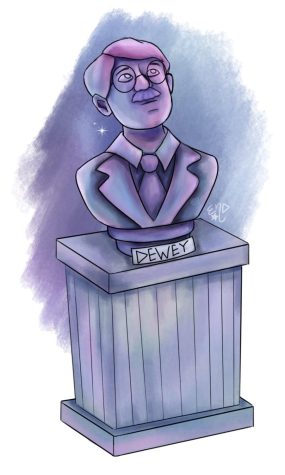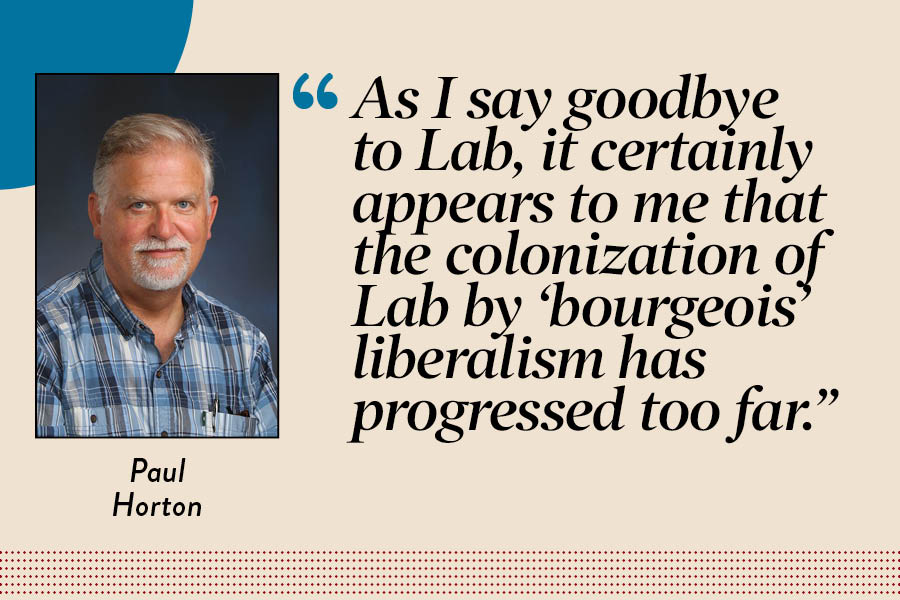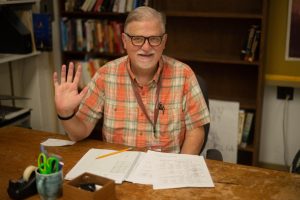Dewey’s ideals are disappearing
History teacher urges Lab community to reconnect with foundational values
Midway Staff
Retiring history teacher Paul Horton says that John Dewey’s principles are no longer visible at the Laboratory Schools.
May 24, 2023
When I first came to the Laboratory Schools in 1990, I was scared to death. I was invited to work at one of the most famous schools in the world. John Dewey’s “Democracy and Education” was required reading for all preservice teachers, and I, like most teachers I met at Lab, regarded it as a holy text.
When I finished grad school and began teaching in a rural school in Texas in the early ’80s,the students jokingly called me “the preacher.” Looking back, I did see teaching as my calling, and teaching democracy through history as my vocation.
Democracy was in my cultural DNA when I started my teaching career. A direct descendent from a signer of Charles I’s death warrant during the English Civil War, I come from a family of dissenters, Quakers, and educators. My grandfather was forced to give up his job as a superintendent of a county school system because he fired the principal of the high school who was the leader of the county Klan. The Klan sent two warnings: the burning of a cross on his front yard and the burning of a school after his weekend preschool year inspection.
So, when I came to Lab I was full of zeal, and some would say, a lot of other stuff.

In the early ’90s, teachers talked nonstop about Dewey, democracy and progressive education. Teachers were proud that Lab was a progressive school and they knew a great deal about the context of the Progressive political movement and Dewey’s role in it, and even about his relationship with Jane Addams and Hull House here in Chicago. I can remember having very long conversations in the faculty lunchroom, where Phil Jackson, a legendary professor of education, would share Dewey stories that were handed down in the Education Department once housed in Judd Hall.
I felt really at home in this environment coming from a Texas public school system that was the first in the country to embrace a “back to the basics” curriculum based on standardized assessment.
Over the years this democratic spirit gradually changed. The Lab Schools grew, the composition of the school board changed, the Biological Sciences division was expanded bringing to Hyde Park more East Coasters with Ivy expectations, and the school actively recruited more North Side families with wealth in an effort to raise more money.
A political change also soaked into the Lab ethos. The university added another layer of administrative positions in the last 15 years as the school grew, and there seemed to be a push to control the very strong and active faculty to make the school (especially the high school) safer for parents with more traditional expectations about learning with a focus on competitive college admissions.
In today’s version of Lab, faculty parents in the professional schools in addition to North Side parents who seem to have wrested control of the schools. A neoliberal philosophy that privileges the marketplace, and is hostile to unions and progressive politics, seems to have been imported from the Booth School. Many of these parents speak the language of Gary Becker (Milton Friedman light), referring to the Lab faculty and staff as “human capital,” and the Lab Schools as a part of a “portfolio.” This neoliberal ethos also tends to pay mere lip service to the legacy of Dewey by featuring innocuous quotes on its webpages, ads and T-shirts.
To be sure, faculty are still inspired by Dewey and endeavor to inspire students at Lab using his philosophy and ideas. Dewey’s legacy can also still be seen and felt in the actions of AFT Local 2063 that actively pushes back on the neoliberal control of Lab.
But the die has been cast in recent years as the university’s administration and legal counsel, the school’s director, and the school and university human resources departments are seeking to create what sociologist Max Weber called an “iron cage” of rules and regulations for faculty and students. This process has been disheartening for the faculty and students who actually live at Lab and is worsened by the fact that constant administrative churn has destroyed working institutional memory.
I have no doubt that Dewey would have been very concerned with what has happened to his school.
The real John Dewey would seem much more like Bernie Sanders, Elizabeth Warren, Brandon Johnson or AOC to Labbies today. Dewey helped found the American Federation of Teachers, the American Civil Liberties Union, and the NAACP (National Association for the Advancement of Colored People). Alexander Livingstone and Ed Quish write that he also played an important role in the People’s Lobby and the League for Independent Action in the 1930s that were organized to create a third-party challenge to what he considered a plutocratic political system without mentioning that unspeakable word: socialism. The latter organization supported government ownership of mines, transportation and utilities; progressive taxation for public investment; an inheritance tax; and support of union organizing and labor unions. The goal of all of these organizations was to bring together liberals and socialists in a new progressivism that went beyond pre-WWI “liberal” Progressivism.
Indeed, the very idea of the Laboratory Schools was inspired by a train conversation that Dewey had with a union organizer during the Pullman Strike. According to historian Robert Westbrook, Dewey came to believe that union solidarity was the most tangible form of participatory democracy he had witnessed. But because the “Chicago Univ. is a capitalistic institution — that is it belongs to the higher classes,” Dewey decided to recreate the experience of solidarity within the classroom as a way to evolve authentic democracy that would eventually replace “capitalistic institution[s]” based on individualism like the University of Chicago.
This idea is made clearest in his 1937 essay, “Democracy is Radical.” In this essay, Dewey makes the case that the “bourgeois” liberalism of the marketplace had reached a dead end. “By ‘bourgeois’ democracy is meant one in which power rests finally in the hands of finance capitalism, no matter what claims are made for government of, by, and for all of the people.” According to Dewey, “The end of democracy is the radical end… It is radical because it requires great change in existing social institutions, economic, legal, and cultural. A democratic liberalism that does not recognize these things in thought and action is not awake to its own meaning….”
As I say goodbye to Lab, it certainly appears to me that the colonization of Lab by “bourgeois” liberalism has progressed too far.
Dewey challenged us to fight: “But it is simply false that this country, even politically, is merely a capitalistic democracy. The present struggle in our country is something more than a protest of the new class, whether called proletariat or given any other name, against the established industrial autocracy. It is a manifestation of the native and enduring spirit of a nation against the destructive encroachments of forces that are alien to democracy.”
I challenge all of you, teachers and students, to reconnect with Dewey’s legacy to continue fighting the good fight.
To learn more read:
John Dewey, “Democracy is Radical” (1937)
Alexander Livingstone and Ed Quish, “John Dewey’s Experiments in Democratic Socialism,”
Jacobin, January 8, 2018
Robert B. Westbrook, “Schools for Industrial Democrats: The Social Origins of John Dewey’s
Philosophy of Education,” American Journal of Education (Aug. 1992)






























































Lab '12 • Jun 2, 2023 at 4:30 pm
Olde Lab chiming in:
I largely agree with the sentiment of this article. In the 10 years since I graduated from Lab (as a lifer) the school has changed in tangible ways. The biggest area of change I see, which doesn’t end up being the focus of this article, is the school’s shift away from its University of Chicago roots, with the increased enrollment of students from non-UChicago affiliated, northside families, an expanded Administrative staff, and skyrocketing price of tuition. This has deeply impacted the kookie, Hyde Park, UChicago spirit of Lab, creating a more conventional prep school atmosphere.
I don’t fully agree with Horton’s representation of this change and the article spirals down a Dewey-centered rabbit hole. To be honest, I don’t think the socialist-loving Dewey would approve of the Lab schools even in the 90s when Horton arrive. However, I do think that Horton still has a broader point to make: Lab school must grapple with its changing character. Are we ready to be just another Chicago private school?
Yuli Arseniy • May 31, 2023 at 12:36 am
Communist gobbledygook that almost defames the booth school and the central principles of economics in the name of “education.” This sounds like elitism in its purest form.
Lab ‘21 • Jun 1, 2023 at 12:29 pm
Perhaps you don’t understand elitism, friend. The elites aren’t unionists, educators, or the generations of Black and Brown residents of Hyde Park. Rather, they are the nouveau-riche of tech, finance and industry who demand that their tuition money grant them executive decision over curriculum. “Progressive education” doesn’t mean teaching higher taxes and communism – it means challenging shallow and prescriptivist educational philosophies entrenched in our institutions. Read the recommended texts; you might learn something!
Yuli Arseniy • Jun 3, 2023 at 9:17 am
perhaps you don’t understand what I was saying, friend. I was never calling the individuals that the elitist propaganda was targeted towards elites, I was calling the people who push such destructive ideals elites. College-educated ivory tower folks, likely such as yourself, are typically the ones who contribute nothing good to society. For example, 150 years ago eugenics was as large of a field as the discrimination field today. The booth school professors may be elites but this relationship(if only you knew!) functions much differently. Libertarianism in markets is what drives innovation and always has unintended benefits because that is how capitalism functions. The drive for money actually improves society. The notion that an incompetent man who has good intentions in mind can control society and markets effectively is very wrong. Read the recommended texts; you might learn something too!
Lab '19 • Jun 20, 2023 at 6:46 pm
Are your “recommended texts” Dr. Seuss books?
Yuli Arseniy • Jul 24, 2023 at 1:13 pm
wheres the argument?
Michael McPherson • Jul 22, 2023 at 6:50 pm
Certainly, capitalism and market theory have their place in understanding our society. But so, too, do ideas of altruism and educating children for their own good. I would expect an article about the author’s perceptions of how schools founded by a man with noble, democratic, and reasoned principles to highlight the changes they have perceived as time has passed during their time at those schools. Acknowledging a move away from schools founded on the idea of how education is best provided through strong interaction with the community surrounding the schools to ones with an expansive administrative bureaucracy and attendant need for greater financing is neither communist nor elitist. It is simply an understanding of the fundamental changing nature of the schools themselves.
Vivi '20 • May 30, 2023 at 1:07 pm
All I have to say is PREACH! I’m majoring in psychology and education studies and when we read Dewey I was thinking… this man is ROLLING IN HIS GRAVE with how the school he founded is doing.
Jonah • May 26, 2023 at 12:19 pm
Bravo!
Meredith • May 25, 2023 at 4:11 pm
Learning democracy and living democratically. Thank you Paul!
David • May 24, 2023 at 8:08 pm
In school, you are educated. But in Mr. Horton’s class, you feel educated. You feel that a ribbon has been laid through a maze. You feel that a ductile anchor has taken hold.
michael cole • May 26, 2023 at 6:44 pm
Dewey’s critique of liberal democracy perfectly fits the spectical that were are all enduring. Linking the idea of radical democracy to the task of bending the bars of straightjacket education is an idea that never grows old.
Many thanks to my grandson for sending this along.